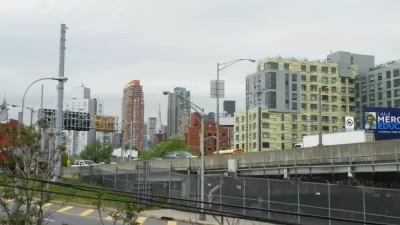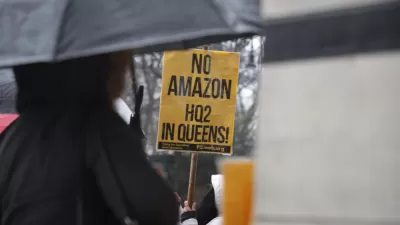Amazon's second headquarters is huge, and their bias for walkable places says they are going to do it all over again in a new city. However, maybe they should take the high road and not beg for subsidies.
Amazon dropped a bombshell last week when they announced that they’re going to expand from Seattle by building a brand new second headquarters in another city. Based on the qualifications in their RFP, like on-site access to transit and connectivity options like sidewalks and bike lanes to “foster connectivity between buildings/facilities,” it’s another example of how companies are increasingly seeking out vibrant, walkable, connected urban places as they try to attract and retain talent.
Michael Rodriguez, director of research at Smart Growth America, shows how prior research and experience points to a move towards vibrant urban locations for corporations, and that corporations need those environments to compete. Cities also know this, and the new model of economic development is not through subsidies, but through providing supportive policy and infrastructure that enables companies to attract talent.
FULL STORY: Amazon's Hunt for a Second HQ is Likely to End in a Vibrant, Urban, Walkable Place

Alabama: Trump Terminates Settlements for Black Communities Harmed By Raw Sewage
Trump deemed the landmark civil rights agreement “illegal DEI and environmental justice policy.”

Study: Maui’s Plan to Convert Vacation Rentals to Long-Term Housing Could Cause Nearly $1 Billion Economic Loss
The plan would reduce visitor accommodation by 25% resulting in 1,900 jobs lost.

Planetizen Federal Action Tracker
A weekly monitor of how Trump’s orders and actions are impacting planners and planning in America.

Wind Energy on the Rise Despite Federal Policy Reversal
The Trump administration is revoking federal support for renewable energy, but demand for new projects continues unabated.

Passengers Flock to Caltrain After Electrification
The new electric trains are running faster and more reliably, leading to strong ridership growth on the Bay Area rail system.

Texas Churches Rally Behind ‘Yes in God’s Back Yard’ Legislation
Religious leaders want the state to reduce zoning regulations to streamline leasing church-owned land to housing developers.
Urban Design for Planners 1: Software Tools
This six-course series explores essential urban design concepts using open source software and equips planners with the tools they need to participate fully in the urban design process.
Planning for Universal Design
Learn the tools for implementing Universal Design in planning regulations.
Caltrans
Smith Gee Studio
Institute for Housing and Urban Development Studies (IHS)
City of Grandview
Harvard GSD Executive Education
Toledo-Lucas County Plan Commissions
Salt Lake City
NYU Wagner Graduate School of Public Service





























